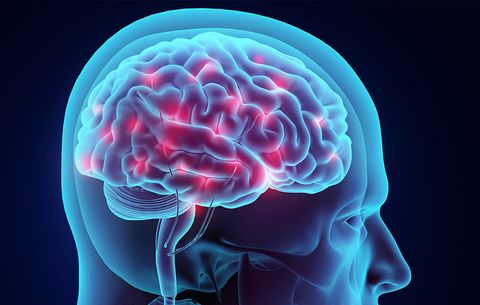

Gordon Gekko from Wall Street, Don Draper from Mad Men, and Frank Underwood from House of Cards are all charming, manipulative people who totally lack a social conscience and exploit other people for their own gain. In other words, they’re sociopaths.
“The key characteristic of [a sociopath] is that they have very little regard for others,” says Edward Poa, MD, chief of inpatient services at the Menninger Clinic in Houston, TX.
In reality, though, it turns out that a lot more traits are considered when a doctor is determining whether a person is a sociopath. And while many sociopaths in movies and on TV manage to turn their lives around, that’s not always the case in real life.
Here’s everything you should know about sociopaths — including how to spot one yourself.

Getty ImagesAlexander Spatari
What is a sociopath?
The technical term for sociopathy is “antisocial personality disorder,” and is a mental health condition in the same vein as narcissistic personality disorder and borderline personality disorder. People who have antisocial personality disorder consistently ignore the concepts of right and wrong and the feelings of other people, and are known to be harsh, impulsive, or even violent. Perhaps worst of all, they don’t show any remorse for their behavior.
What’s the difference between a psychopath and a sociopath?
“The terms ‘sociopath’ and ‘psychopath’ pre-date the modern era of psychiatry,” says James L. Griffith, MD, professor of psychiatry and behavioral sciences at the George Washington University School of Medicine and Health Sciences in Washington, DC. Today, these terms actually both refer to antisocial personality disorder.

Getty
How to spot a sociopath
Antisocial personality disorder can be diagnosed by licensed mental health professionals, like psychiatrists, psychologists, and social workers. It’s only diagnosed in adults 18 years of age or older, but before reaching a diagnosis, psychiatrists and mental health professionals will consider numerous factors, like family history, environment, childhood behavior, and the possibility that these symptoms are being caused by another mental health disorder like bipolar or schizophrenia, says Holly Crisp-Han, M.D., clinical associate professor at Baylor College of Medicine in Houston, TX.
Common sociopath traits
Can sociopaths change?
In short: probably not. Experts caution that there are little to no treatment options for antisocial personality disorder, a complex mental health condition that is influenced by a multitude of factors and is not well understood, says Dr. Griffith. “The problem with the DSM-5 diagnosis is that it simply provides a label for this pattern of symptoms, offering no explanation for what causes this disorder or how to treat it,” he explains.
Because sociopaths do not recognize they have a personality disorder, they may only seek treatment for other related symptoms, such as anxiety and depression, or issues that arise as a result of their behaviors, like substance abuse, or legal help after criminal activity.
“One of the challenges facing clinicians is that there are limited data regarding treatment outcomes in this patient population. It is difficult for clinicians and researchers to make definitive recommendations regarding the best approach to treatment given that different studies of antisocial personality and psychopathy have used a variety of different measures to consider the question. Future research is necessary,” emphasizes Dr. Crisp-Han.
From: Prevention US
Source: Read Full Article